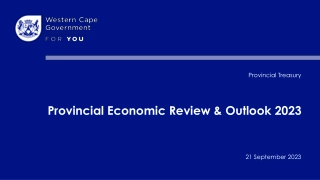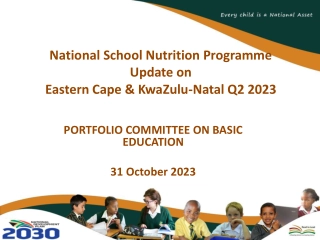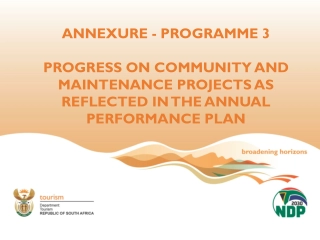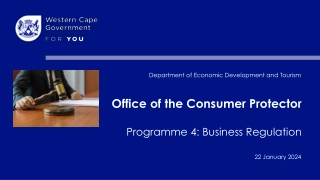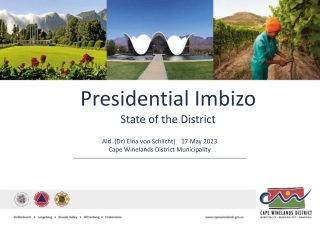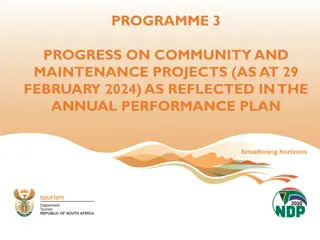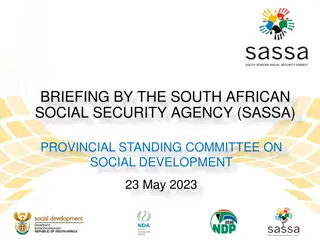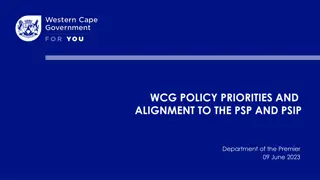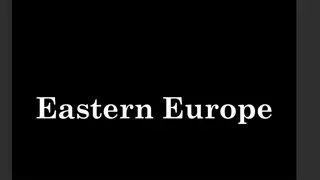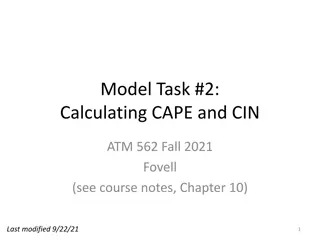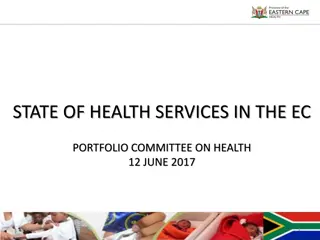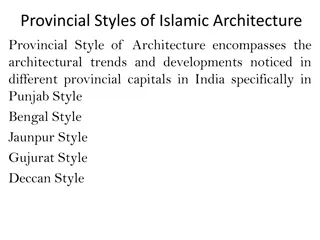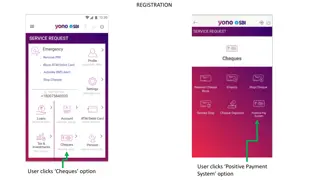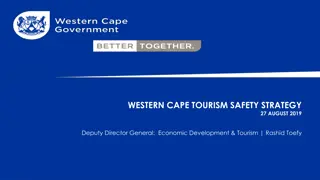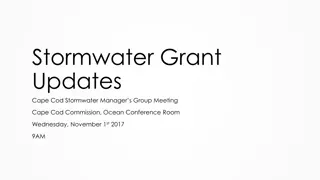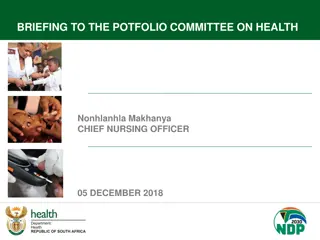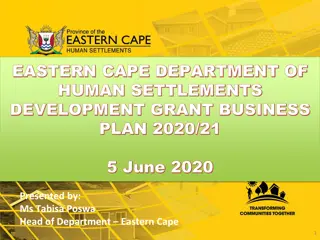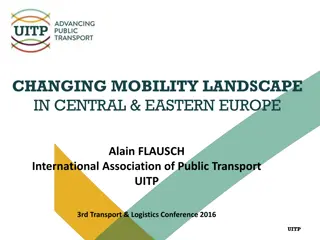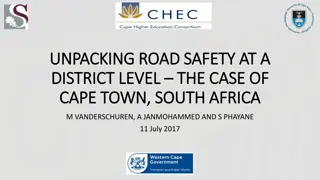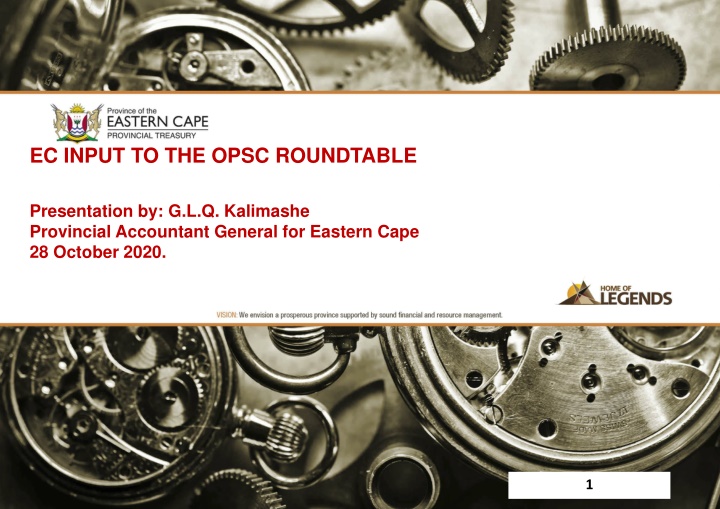
Insights on Supply Chain Management and Creditor Payment in Eastern Cape
Gain valuable insights on Supply Chain Management and Creditor Payment performance in Eastern Cape, including issues with irregular expenditure and poor spending outcomes. Delve into the pillars of a transformed public procurement system and key performance indicators for SCM.
Download Presentation

Please find below an Image/Link to download the presentation.
The content on the website is provided AS IS for your information and personal use only. It may not be sold, licensed, or shared on other websites without obtaining consent from the author. If you encounter any issues during the download, it is possible that the publisher has removed the file from their server.
You are allowed to download the files provided on this website for personal or commercial use, subject to the condition that they are used lawfully. All files are the property of their respective owners.
The content on the website is provided AS IS for your information and personal use only. It may not be sold, licensed, or shared on other websites without obtaining consent from the author.
E N D
Presentation Transcript
EC INPUT TO THE OPSC ROUNDTABLE Presentation by: G.L.Q. Kalimashe Provincial Accountant General for Eastern Cape 28 October 2020. 1
Contents Purpose. Supply Chain Management Performance Creditor Payment Performance 2
Purpose To share insights on the performance of Supply Chain Management and Creditor Payment Period in Eastern Cape. 3
Context of Supply Chain Management Performance (1 of 2) Pillars for a transformed public procurement system (General Procurement Guidelines) includes: o Value for money Can also mean not going for the cheapest bid if this would mean an inferior product/service o Open and effective competition Ensure, that everybody has a reasonable chance to compete for tenders through a transparent and clear process o Ethics and fair dealing Proper conduct of government officials and suppliers o Accountability and reporting From supplier and government departments o Equity and redress Promotes business with Previously Disadvantaged Individuals (PDIs) 4
Context of Supply Chain Management Performance (2 of 2) Performance on the Pillars In the public sector we have not moved beyond purchasing function and even this is transactional and has compliance as the only focus. SCM is the biggest (more than 80%) driver of irregular expenditure in EC, with last audited (2018/19 financial year) figures standing at R4.1 bn (unaudited for 2019/20 financial year is R3.7 bn). SCM also accounts significantly for poor spending outcomes (budget and efficiencies) and audit outcomes (negative findings on SCM). 5
Context of Supply Chain Management Performance (1 of 3) List performance indicators for SCM o Irregular expenditure o Management of conflicts o Procurement Plans 6 8
CUMULATIVE IRREGULAR EXPENDITURE BALANCES 2015 - 2020 2014/15 2015/16 2016/17 2017/18 2018/19 2019/20 TOTAL R'000 R'000 R'000 R'000 R'000 R'000 R'000 Opening Balance 5 807 427 4 940 882 5 816 921 4 487 591 4 742 180 4 094 044 Incurred: Prior Year Contracts 955 355 515 881 1 201 551 493532 914 617 205 600 767 272 314 064 872 974 534 202 318 053 153 779 4 074 467 2 217 058 Current year 439 474 708 019 709 017 453 208 338 772 164 274 2 812 764 Restatements (335 002) 1 043 487 (70 802) (441 362) (29) - 196 292 Condonation (1 486 898) (1 368 999) (2 173 146) (71 321) (1 521 081) (711 430) (7 332 875) Closing balance 4 940 882 5 816 921 4 487 591 4 742 180 4 094 044 3 700 667 7
TRANSGRESSIONS RESULTING IN THE IRREGULAR EXPENDITURE BALANCES AS AT 31 JANUARY 2020 Root Causes Amounts % Transgression of procurement process (e.g. less than 3 quotations, Service rendered without an order, less than 21 days advertisement, incorrect point applied) Conditional grants which contravened TR 8.4.1 & SASA sec 37(1) & DORA Deviations without reasonable justification Extension of Expired contracts without following bid process Violation of HR Prescripts Using Single Source supplier Virements not in line with S43 of the PFMA Irregular Roads contracts transferred from DPW Variation orders not approved by PT Incorrect classification as Transfers instead of Good & services 1 983 176 53.6% 500 014 13.5% 405 994 232 954 223 857 196 607 70 690 40 175 35 608 11 591 11.0% 6.3% 6.0% 5.3% 1.9% 1.1% 1.0% 0.3% TOTAL 3 700 666 8
Conflict of interest (1 of 3) Table 3: CONFLICTED OFFICIALS FOR THE 2020/21 FINANCIAL YEAR NAME OF DEPARTMENT Q4 NO OF ORDERS Q1 NO OF ORDERS Q2 NO OF ORDERS VALUE OF ORDERS VALUE OF ORDERS VALUE OF ORDERS 2019/20 2020/21 2020/21 Cooperative Governance and Traditional Affairs 1 1 R 1 984 555.00 2 6 R 464 080.68 1 1 R 90 013.41 Public Works 1 2 R 1 541 497.65 0 0 R - 0 0 R - Education 3 3 R 61 580.00 0 0 R - 0 0 R - Health 4 7 R 769 344.96 3 7 R 5 353 578.70 9 18 R 661 058.20 Transport 2 3 R 117 258.46 1 1 R 21 350.00 2 2 R 1 668 625.44 TOTAL 11 16 R 4 474 136.07 6 14 R 5 839 009.38 12 21 R 2 419 697.05 2 9 9
Conflict of interest (2 of 3) 5.1 The table above reveals that in Quarter 2 of the 2020/21 FY, the majority of Conflicted Officials were in the Department Health, nine (9) officials which constitutes 75%, followed by Transport, with two (2) officials which constitutes 17% and Cooperative Governance and Traditional Affairs with one (1) officials which constitutes 8%. 5.2 In terms of orders received by conflicted officials, the Department of Transport accounted for 69% (R1.7m), Department of Health 27% (R661 058.20) and Department of Cooperative Governance and Traditional Affairs 4% (R90 013.41). 5.3 In Quarter 2 of the 2020/21 FY, there were 2 departments who reduced the value of the orders received since Quarter 1 and 1 department who increased the value of orders received since Quarter 1 . 10 2
Conflict of interest (3 of 3) 5.3.1 The Department of Cooperative Governance and Traditional Affairs reduced the value of orders received from R464 080.68 in Quarter 1 to R90 0013.41 in Quarter 2. This equates to a 81% reduction. 5.3.2. The Department of Health reduced the value of orders received from R 5 353 578.70 in Quarter 1 to R661 058.20 in Quarter 2. This equates to a 88% decrease. However, the number of conflicted officials increased from 3 to 9 (200%). 5.3.3 The Department of Transport increased the value of orders received from R 21 350.00 in Quarter 1 to R1 668 625.44 in Quarter 2. This equates to a 772% increase. 5.3.4 It must be noted that conducting business with the state is an offense, irrespective of the value of the order. 5.4 PT will be issuing COI letters for Quarter 2 of the 2020/21 FY to the Accounting Officers of the affected Departments. In the letters, the Departments will be urged to respond to the PT within 5 working days. . . 2 11
Procurement Plans (1 of 2) Comparison of contracts awarded for the period 01 April 2020 31 September 2020 against the planned target (top six departments) Department Actual Approved Awards Against Planned Planned Awards for the Period 01 April 2020 30 Actual Awards Against Planned Target Target as at 31 August 2020 September 2020 No. of Projects Value No. of Projects Value No. of Value % of planned awards Projects achieved Health 29 R122 782 017 57 R 262 953 387 30 R 125 130 250 52.63% Transport 0 R 0 0 R 0 3 R 26 338 169 +300% Education 0 R 0 0 R 0 0 R 0 0.00% Human Settlements 1 R 899 766 0 R 0 0 R 0 0.00% Public Works 0 R 0 16 R 39 490 988 0 R 0 0.00% DRDAR 44 R 62 573 039 29 R 48 430 000 60 R 80 983 322 206.90% Total 74 R 186 254 822 102 R 350 874 375 93 R 232 451 741 91.18% 12
Procurement Plans (2 of 2) Comparison of contracts awarded - Continued 9.1 From the table above, it is apparent that the top six departments in terms of the value of projects to be contracted for during the period under review have only awarded 93 (91.18 %) bids at a value of R 232 451 741 out of the total number of 102 bids planned to the value of R 350 874 375: The Departments of Education and Human Settlements did plan any awards for the period under review; Department of Public Works was the worst performing without having awarded any of the planned awards for the period under review; Department of Health followed with 52.63%; and Department of Rural Development and Agrarian Reform achieved 206.90%. The overachievement is as a result of the Department utilising the lockdown period to prepare for fencing projects which were expedited when the construction industry re-opened. It must also be noted that the Department of Rural Development and Agrarian Reform has added 1 infrastructure contract award which was not reported in the previous month. 9.2 Based on a month-to-month comparison between August 2020 and September 2020, the top six departments awarded an additional 19 bids. Collectively, 2 of the top six departments failed to award 43 planned bids as follows: Department of Health- 27 bids; and Department of Public Works- 16 bids. 13 13
PT Interventions on improving Procurement Covid 19 procurement experience The resilience of the SCM system has been tested during Covid 19 and EC has not been spared. The most affected sector was Heath and Education on the availability of PPEs and other equipment Few tenders caught the public eye on the perception of corruptions relating to Covid 19 but these are said to have been initiated before Covid 19 EC has decided to review all Covid 19 related expenditure to the extent that they are not covered by the AGSA audit. 14
PT Interventions on improving Procurement Positive developments for EC For the Eastern Cape the following are likely to improve the SCM performance in the medium-term (next 3 years) o Local Economic Development Procurement Framework (LEDPF) has been introduced and is starting to show results (for 2020/21 financial year about R1.8 bn has been spent to EC registered suppliers, representing 60 per cent). o Transversal contracts are taking root (currently EC has Stationery, Protective Clothing, PPEs) 15
PT Interventions on improving Procurement Parallel to supporting departments, PT has engaged the services of GTAC to do a comprehensive review of Provincial Supply Chain Management and some of the deliverables, include: o Thorough diagnostic of SCM performance; o Possibilities Paper o Proposed Blueprint and transitional road map for a transformed SCM regime 16
Creditor payment period 17 17
Legal Mandate Public Finance Management Act (PFMA) o Section 38.1.f states that, the Accounting Officer for department, trading entity or constitutional institution- must settle all contractual obligations and pay all money owing, including intergovernmental claims, within the prescribed or agreed period. National Treasury Regulations (NTR) o Expenditure Management- Responsibility of Accounting Officer, NTR 8.2.3 states that, unless determined otherwise in a contract or other agreement, all payments due to creditors must be settled within 30 days from receipt of an invoice or, in the case of civil claims, from the date of settlement or court judgement. 18
September 2020 Unpaid Invoices Exceeded 30 Days (1 of 2) NUMBER OF INVOICES OLDER THAN 30 DAYS NOT PAID DAYS OFFICE OF THE PREMIER 0 PROVINCIAL LEGISLATURE 0 HEALTH RAND VALUE OF INVOICES NOT PAID OLDER THAN 30 POVINCIAL DEPARTMENT (S) REASONS FOR NON-PAYMENT OF INVOICES 0.00 No outstanding invoices per signed submission 0.00 No outstanding invoices per signed submission Insufficient Funds(Medico Legal & Department of Justice over Billion rands) supplier banking details on invoice differ from CSD, change of supplier banking details, System closed for authorisation due to Covied 19, incorrect banking details on invoice. 2 064 669.88 non recommitment of Accruals . 0.00 No outstanding invoices per signed submission Change of banking details, late submission of invoices,incorrect billing by suppliers and dispute about the rates, budget shifting requests coming after the budget has been loaded and locked. 0.00 No outstanding invoices per signed submission 124 174.00Incorrect invoices submitted by Service Providers. Offices closes due to Covied 19. Invoice have queries and the team is working to resolve them with suppliers and SCM. Order has been created to process outstanding invoices and some invoices have been received from supplier and payment will be process in the coming month . 2 298 420.24 Delays in recommiting 24 518.58Delays in development of expenditure approval and commitments for the new financial year. 0.00 No outstanding invoices per signed submission 3 Invoices amounting to R 18 132.69 were queries but on process now. 12 invoices amounting to R 698 361,71 to be cleared from the system. 0.00 No outstanding invoices per signed submission 2 072 962 044 10 854 1 942 574 678.00 SOCIAL DEVELOPMENT PUBLIC WORKS BASIC EDUCATION 93 0 130 122 003 143.00 COGTA DRDAR 0 4 DEDEAT 7 3 155 945.78 TRANSPORT HUMAN SETTLEMENT 77 4 PROVINCIAL TREASURY DSRAC 0 15 716 494.40 SAFETY AND LIAISON 0 TOTAL (S) 11 184 Source : Submission from Provincial Departments 19
September 2020 Unpaid Invoices Exceeded 30 Days (2 of 2) OTP, Provincial Legislature, Public Works, COGTA, Provincial Treasury and Safety and Liaison have submitted nil returns in September 2020. The total numbers of invoices that were older than 30 days, that have not been paid by provincial departments were 11 184 invoices amounting to R2, 072 billion (as reflected in table above). The bulk or 97 % of these of invoices are from Health department (10 854 invoices amounting to R1, 942 billion). 20
Common explanations sited for not processing of payments within the prescribed period Change of banking details without notifying department and payment rejecting after processing. Invalid Tax Clearance Certificate during the time of payment. Invalid CK Certificate (Company Registration Certificate) during the time of payment. Incorrect billing by suppliers i.e. Invoice information differ from quotation and order (number of days/officials/items) . Invoice without a corresponding order i.e. supplier has rendered/delivered services or goods without an official order from government. Supplier charging VAT whilst not a registered VAT Vendor. Budget controls or commitments that are not cash backed, where processing of payments is held back to wait for budget (mostly in the last quarter/half of the financial year). Inadequate performance management and accountability systems. 21
PT Interventions on Late Payments Amongst other measures, PT has just developed a system called Have I Been Paid (HIBP), with following benefits: o Suppliers are able to track their submitted invoices and follow-up with departments when there are delays. o Built in the system is the complaints procedure, which guides suppliers on when to escalate their queries up to the level of engaging PT (Customer Services Desk) to follow-up with departments on their non- payments. o The system is also accessible through laptops and cellphones, wherein suppliers can have access to the system at their comfort and convenience. 22
THANK YOU 23

